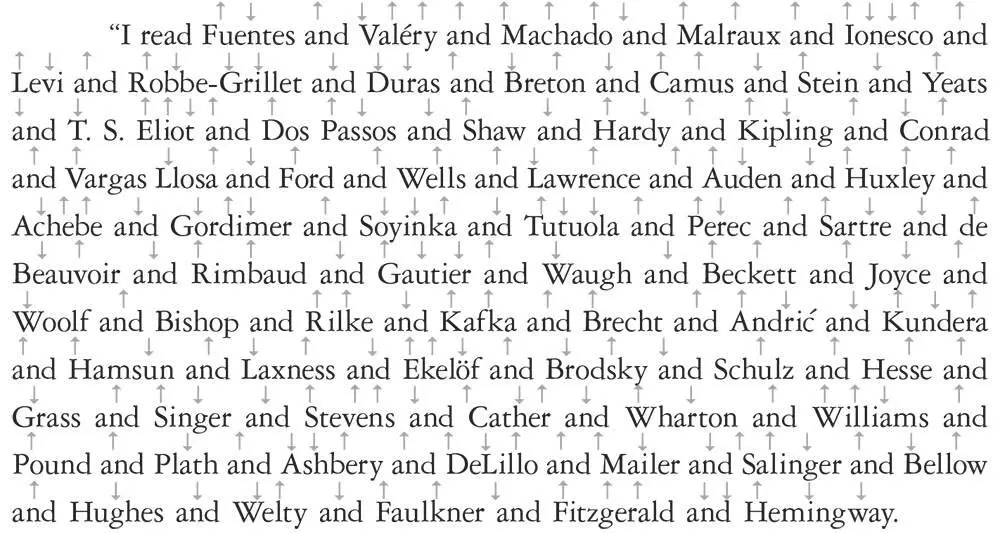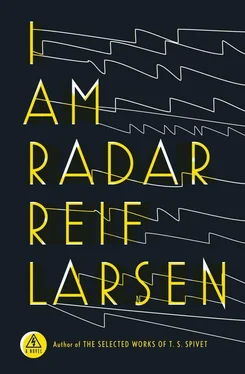“And then there were the books. The first thing I did when I was well enough to speak was to demand books. Now that the library was gone, these were hard to come by, but they were brought in from the college, which was under government protection and had been spared from the rebels’ assault. I opened each book I received and just as quickly shut it, for I had already absorbed its contents. It was a kind of constant torture — reading no longer yielded the pleasure it once had for me: I was invariably hungry for more, and yet my hunger could never be satiated. I read every book in that library before I could even rise from my bed. I read and read and never reread, for once was more than enough. When I had read all the books in Kisangani, I had them send for more from Kinshasa and from South Africa and Kenya. I wrote letters to all of my contacts in Paris, in London, in New York, in Buenos Aires, anywhere I could find. . I explained what had happened; I explained that I needed more books, that I would die without my books. All this before I could walk. The books began to come. . My friends around the world took pity on me. And I read like an addict, like a man gasping for air.” His voice fell into a kind of trance. “I read Homer and the plays of Euripides and Aristophanes. I read Plato and Aristotle and Lucretius and Cicero. I read Virgil and Ovid and Sappho and Seneca. I read Saint Augustine. I read the Koran and the Torah and the Talmud and the Bible again for the first time. I read Dante and Machiavelli and Chaucer and Marlowe. I read Dogen and the Sutras. I read all of Shakespeare. I read Bacon and Milton and Dumas and Vaughan and del Castillo and Swift and Cervantes and Diderot and von Kleist and Goethe and Corneille and Mistral and Rochefoucauld and Molière and Rousseau and Voltaire and Burke and Pelayo. I read Khaqani and Rudaki and Rumi and Khayya¯m and Hafiz and Saadi and Attar. I read Defoe and Asturias and Sterne and Stendhal and Verga and Carducci and Blasco Ibáñez and Hugo and Verne and Balzac and Stendhal and Flaubert and Baudelaire and Sand and Verlaine and Paz and Maupassant and Ibsen and Wordsworth and Austen and Coleridge and Shelley and Keats and Blake and Scott and Carpentier and García Márquez and Puig and Cortázar and García Lorca. I read Dickens and Stevenson and Eliot and Wilde and Cabrera Infante and Onetti and Thackeray and the Brontës and Proust and Borges and Carroll and Trollope and Ruskin and Hoffman and Nietzsche and Emerson and Dickinson and Whitman and Melville and Hawthorne and Shelley and Poe and Gogol and Pushkin and Turgenev and Dostoyevsky and Tolstoy and Blok and Leskov and Chekhov and Pessoa and Thoreau and Alcott and James and Twain and Naipaul and Calvino and Nabokov.” Horeb began to beat lightly on his drum.

And I read them in that order.”
He stopped. A cavity where drum and voice had once been.
“The small house where I was staying was overrun with books. Thousands of books. My hosts were gracious, as ever, but they had grown weary of these deliveries. Their son, my docent, was doing his best to organize the books, but their sheer volume was already putting them in great danger if the rebels should ever return. I could no longer look my hosts in the face, because I already knew too much about them. From that very first look, I knew them better than they knew themselves. Memory is a weapon too powerful for any one man to yield. . I have come to realize that forgetting is our greatest gift. This is one memory I shall never have: the memory of how not to remember.”
His face suddenly looked stricken. He tapped his parasol against the barge. The birds fluttered beneath him.
“One day they asked me to leave. . Of course, knowing them, I already knew such a request was coming. I already knew everything that was coming before it came, because the future always arises from the past. I managed to thank my hosts, and then I fled to the jungle with my books. I did not even pay my respects to my brothers’ graves or the burnt ruins of the monastery. I was too distraught. You can still see these ruins on the banks of the river. But I soon found I had other troubles. After the fire, my skin had become extraordinarily sensitive to the sun. The ash had turned me the most terrible color of white. . Well, you can see for yourself what I have become. Before, I was dark, almost like a Peruvian. But now. .” His voice drifted. “Their son, the docent, insisted on coming with me. I forbade him, but he would not hear of it. He was to be the first of what would later become an army. Together, we built a large, five-walled structure by the river — a pentagon. The perfect repository for my books. I thought it would hold all the books I could ever possibly want. I set about writing a hundred letters a day, asking for more books. More books for my African library. I gave gentle instructions for the books they might want to send. Get me Krleža and Slaveykov and Oe, I would write, and the books continued to come, but there were not enough. There were never enough. The more I read, the more I knew I had not read. And so I realized something must be done. I left my library in the hands of my docents and spent one year traveling the world, telling my story, showing my burns. I pleaded for more books. I negotiated the donation of 573 libraries and private collections — in Murmansk, in Bulawayo, in Alta, in Akron, in Havana, in Bangalore. I met with publishers in Madrid, New York, Frankfurt, Milan, London. I asked them to send me anything they could spare. This was the same year I met Alfonso Daneri in Buenos Aires. He agreed to be one of my shepherds. .
“You can’t imagine how painful this travel was. . One year in the world for me was like ten thousand lives lived for other men. I can now easily draw a map of every city in the world. I can recount house numbers, the arrangement of flowers in the windowsill. . the shape and make of door knockers, mailboxes, linden trees, sewer grates, traffic lights. I can never forget any of it. . It’s torture, torture . . I can’t convey the torture. But it was worth it, this pain of remembering. It was worth it for the books. You see, people took up my cause with great enthusiasm. Each of them thought that they, and they alone, were saving my library — and they were right, but what they did not realize is that there were thousands like them, each believing they were making the world whole again. And so: the books came. They came by the crateful. . by the boatful. So many books. . fourteen thousand boatloads. As the country collapsed, my library grew and grew. Suddenly the problem became not where would I get the books but where would I put them. I had to build another pentagon. And another. My team of docents grew. I don’t know how word spread, but they came from all over the country. You will meet them. . soon. I trained them in the arts of classification, and it became their enormous task to organize all of these books.”
“How many books are we talking about?”
“The larger the library, the more uncertain the collection. . This is the third law of accumulation, as stated by Jarmuch Hovengär. Even I do not know exactly the number of books we have. Of course, we also started to amass many copies of the same book; we had over four hundred copies of Anna Karenina alone. We had thousands of Bibles, all editions, all translations. We continued to accept donations, but I also had to become more selective. At a certain point, I already had most books. So I started to fill out the edges of the collection. I made contacts with liaisons working in different countries, in different languages, and they would ask me what I wanted and I would simply say, ‘Get me one of every book.’ People like it when you tell them this. It turns them into bloodhounds. . They would send me the most spectacularly rare books for free, to the middle of Africa! For many of them it became a religion.”
Читать дальше













